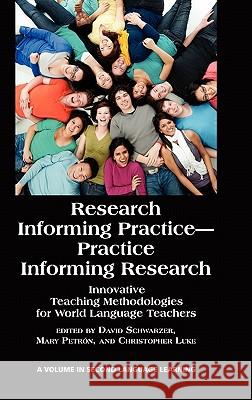Research Informing Practice-Practice Informing Research: Innovative Teaching Methodologies for World Language Teachers (Hc) » książka
Research Informing Practice-Practice Informing Research: Innovative Teaching Methodologies for World Language Teachers (Hc)
ISBN-13: 9781617353918 / Angielski / Twarda / 2011 / 238 str.
Research Informing Practice-Practice Informing Research: Innovative Teaching Methodologies for World Language Teachers (Hc)
ISBN-13: 9781617353918 / Angielski / Twarda / 2011 / 238 str.
(netto: 366,00 VAT: 5%)
Najniższa cena z 30 dni: 381,94
ok. 30 dni roboczych.
Darmowa dostawa!
Edited by David Schwarzer, Montclair State University, Mary Petron, Sam Houston State University, and Christopher Luke, Ball State University A volume in Research in Second Language Learning JoAnn Hammadou Sullivan, Series Editor "Research Informing Practice-Practice Informing Research: Innovative Teaching Methodologies for World Language Educators" is an edited volume that focuses on innovative, nontraditional methods of teaching and learning world languages. Using teacher-research projects, each author in the volume guides readers through their own personal journey and exploration of teaching methods, novelty, risk-taking, and reflection. Chapters include guiding questions, vignettes, and thick descriptions of classroom-based research in an assortment of instructional settings. Theoretical issues and an array of practical applications are presented, as well as additional research opportunities and guidelines for implementation in a variety of teaching and learning venues. While not professing to be a panacea for world language learning, this book provides various lines of theory, research, and practice as they interact with each other through teacher-research narratives. As a well-known African proverb asserts, "It takes a village to raise a child." Similarly, it takes a village to develop a master teacher, and it takes a community to create an exceptional classroom. Throughout this volume, authors share their voices, experiences, and expertise as a means of strengthening the village. They then invite readers to embark on their own methodological journeys. The text thus serves as a stimulus for further discussion and pedagogical development in world language settings. Teachers and researchers are challenged to think critically and reflectively about world language education, encouraged to design innovative methods, approaches, and techniques for their world language classes, and ultimately asked to share their findings with students, parents, peers, communities, and the village."











